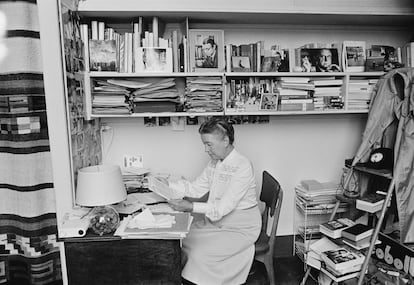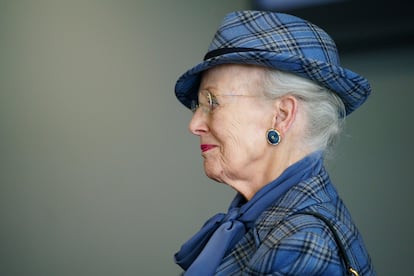The Danish queen who translated Simone de Beauvoir
Remembered above all for ‘The Second Sex,’ the French feminist is also the author of a raft of novels and memoirs in which she variously reflects on death

Queen Margrethe of Denmark, who has just ceded the throne to her son Frederik, translated Simone de Beauvoir’s novel, All Men Are Mortal, in the 1980s. Not many active monarchs have devoted themselves to literary translation, in this case of a French writer remembered above all for The Second Sex (1949), a book that continues to be tremendously influential and quoted. However, Beauvoir was much more than a pioneer of feminism.
Her novels, such as The Mandarins, a raw portrait of liberated Paris for which she won France’s most prestigious literary prize, the Prix Goncourt, in 1954, are extraordinary. But perhaps most enduring are her memoirs, which were collected in two volumes by the Pléiade editorial collection in 2018. The influence on the European literary canon of the Gallimard classics collection — of which the Pléiade collection is a part — is so resounding that, when his novels appeared in it, Peruvian author Mario Vargas Llosa said that he thought it was as important as winning a Nobel Prize, or more so. It has undoubtedly done justice to Beauvoir’s literary legacy: her memoirs paint a portrait not only of her life, but of her entire era. Memoirs of a Dutiful Daughter is a masterpiece about adaptation and rebellion in which each new generation can find itself.
The choice of the title translated by Denmark’s former Queen is also very significant. All Men Are Mortal, an existentialist novel about a Tuscan prince who attains immortality, touches on death, a central theme in her work. Beauvoir also wrote a book as brief as it is impressive about her mother’s illness and death, A Very Easy Death, a volume that barely exceeds a hundred pages, but which is packed with insights. Although death is part of life, Beauvoir reflects it is nonetheless painful and brutal. It is something for which we are never prepared, even though we know it will happen. “You do not die from being born, nor from having lived, nor from old age,” she writes. “You die from something. The knowledge that because of her age my mother’s life must soon come to an end did not lessen the horrible surprise: she had sarcoma. Cancer, thrombosis, pneumonia: it is as violent and unforeseen as an engine stopping in the middle of the sky...” And, in the final words of the book, she says: “There is no such thing as a natural death: nothing that happens to a man is ever natural, since his presence calls the world into question. All men must die: but for every man his death is an accident and, even if he knows it and consents to it, an unjustifiable violation.”

When someone close to us passes away, under whatever circumstances, Beauvoir’s reflections cement the feeling that there is a grief shared by all human beings. No matter how mentally prepared we are, how old we are, or how ill the person who crosses over to the other side is, we will never be prepared. Beauvoir’s mother confessed to her when she knew the end was near: “Death itself does not frighten me; it is the jump I am afraid of.”
Another impressive work by De Beauvoir is The Farewell Ceremony, which deals with Jean-Paul Sartre’s death, her life companion and another literary giant whose shadow is still in evidence in the 21st century. She ends with these words: “His death does not separate us. My death will not bring us together again. That is how things are. It is in itself splendid that we were able to live our lives in harmony for so long.”
Sign up for our weekly newsletter to get more English-language news coverage from EL PAÍS USA Edition
Tu suscripción se está usando en otro dispositivo
¿Quieres añadir otro usuario a tu suscripción?
Si continúas leyendo en este dispositivo, no se podrá leer en el otro.
FlechaTu suscripción se está usando en otro dispositivo y solo puedes acceder a EL PAÍS desde un dispositivo a la vez.
Si quieres compartir tu cuenta, cambia tu suscripción a la modalidad Premium, así podrás añadir otro usuario. Cada uno accederá con su propia cuenta de email, lo que os permitirá personalizar vuestra experiencia en EL PAÍS.
¿Tienes una suscripción de empresa? Accede aquí para contratar más cuentas.
En el caso de no saber quién está usando tu cuenta, te recomendamos cambiar tu contraseña aquí.
Si decides continuar compartiendo tu cuenta, este mensaje se mostrará en tu dispositivo y en el de la otra persona que está usando tu cuenta de forma indefinida, afectando a tu experiencia de lectura. Puedes consultar aquí los términos y condiciones de la suscripción digital.









































